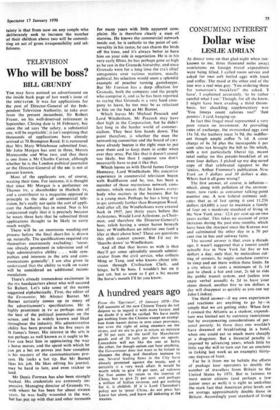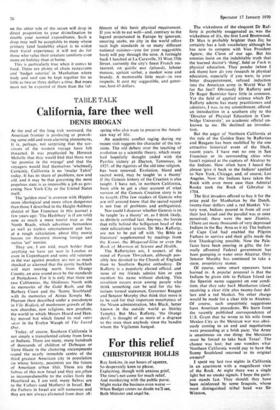CONSUMING INTEREST
Dollar wise
LESLIE ADRIAN
At dinner time on that glad night when (un- known to me, three thousand miles away) restrictions on foreign travel expenditure were being lifted, I called room service and asked for two soft boiled eggs with toast and coffee. The maid at the other end of the line was a real wise guy. 'You ordering these for tomorrow's breakfast?' she asked. 'I have', I explained accurately, 'to be rather
careful what I eat.' Though, for all she knew, I might have been evading a third throm- bosis, her chuckling supplementary was 'You limeys count calories too?' Just pennies', I said, hanging up.
In fact this frugal meal represented a very poor return on investment. At prevailing
rates of exchange, the overcooked eggs cost I Is 3d, the leathery toast 3s 9d, the indiffer- ent though ample coffee 7s Id. A cover charge of 6s 3d plus the inescapable 6 per cent sales tax brought the bill to 30s which, with a not particularly liberal tip, meant total outlay on this pseudo-breakfast of an
even four dollars. I picked up my dog-eared copy of that celebrated signpost to the 'sixties, Arthur Frommer's publication New York on 5 dollars and 10 dollars a day. Where had it all gone wrong?
The first answer, of course, is inflation— which, along with pollution of the environ- ment, now ranks as consumer talking-point number one. A new federal estimate indi- cates that as of last spring it cost 11,236 dollars (f4,680) a year to maintain a family of four on a moderate standard of living in the New York area : 12.6 per cent up on two years earlier. This takes no account of price increases during the past nine months, which have been the sharpest since the Korean war and culminated the other day in a 50 per cent rise in bus and subway fares.
The second answer is that, even a decade ago, it wasn't suggested that a tourist could actually live in New York for five or ten dollars a day; only that, by meticulous cut- ting of corners, he might somehow contrive
to sleep and eat there within these limits. In a city where it costs a minimum of 2s Id
just to check A hat and coat, 2s 6d to ride the public transit system, and (unless you enjoy verbal assault) 4s 2d to have your
shoes shined, another five to ten dollars a day will disappear as quickly as you can say John Lindsay.
The third answer—if my own experiences and reactions are anything to go by—is simply that we are getting older. When first
I crossed the Atlantic as a student, expendi- ture was limited not by currency restrictions
but by overpowering considerations of per-
sonal poverty. In those days one wouldn't have dreamed of breakfasting in a hotel,
when one could eat so much more cheaply at a drugstore. But a financial penalty is imposed by advancing years, which little by
little sap the will to turn out for an omelette in (taking last week as an example) thirty- one degrees of frost.
Far be it from me to belittle the efforts of package tour operators to double the number of travellers from Britain to the United States by 1971. But in fairness to most senior citizens (and perhaps a few junior ones as well) it is right to underline the stark fact that American price levels are on average approximately double those in Britain. Accordingly your standard of living on the other side of the ocean will drop in direct proportion to your disinclination to double your normal expenditures. Such a drop may well be acceptable to many whose primary (and laudable) object is to widen their travel experience; it will not do for those who value their creature comforts even more on holiday than at home.
This is particularly true when it comes to food. There are plenty of chain restaurants and 'budget eateries' in Manhattan where body and soul can be kept together for as little as two or three dollars a time. But more must not be expected of them than the ful-
filment of this basic physical requirement. If you wish to eat well—and, contrary to the legend perpetuated in Europe by ignorant, sneering snobs, no city in the world offers such high standards in so many different national cuisines—you (or your suggestible host) will pay through the nose. A fortnight back I lunched at La Caravelle, 33 West 55th Street, currently the city's finest French res- taurant, on quiche aux epinards, lobster mousse, apricot sorbet, a modest wine and brandy. A memorable little meal—in two respects. It cost my suggestible, and gener- ous, host 45 dollars.



































 Previous page
Previous page